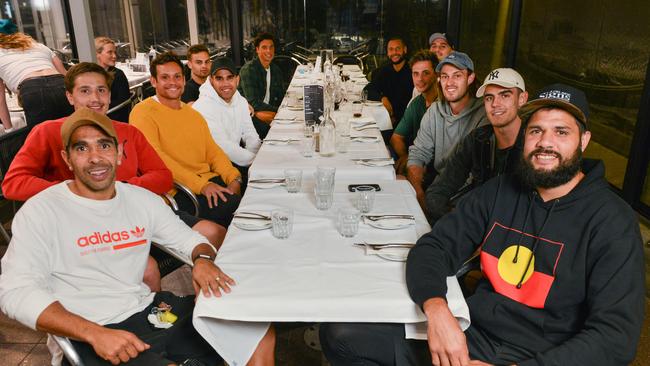Port and Crows indigenous players remove club barriers and unite for dinner after promising to better support each other this season
Adelaide and Port Adelaide’s indigenous players broke down club barriers and came together for dinner on Monday night after making a pact to better support each other this season.
Port Adelaide
Don't miss out on the headlines from Port Adelaide. Followed categories will be added to My News.
- ‘Big Show’ Billy gives contract stocks a boost
- Jonas eyes off Hawks
- Jenkins, Milera could boost Crows
- Lowdown team’s top five indigenous players
Adelaide and Port Adelaide’s indigenous players broke down club barriers and came together for dinner on Monday night after making a pact to better support each other this season.
As the AFL celebrates Sir Doug Nicholls Round this week, Port Adelaide’s Aboriginal Programs director Paul Vandenbergh said the dinner was just the second time they’d come together since Phil Walsh’s death in 2015.

Speaking on The Lowdown podcast, he also said the soon-to-be-released Adam Goodes documentary charting the sad end to his career would “shake the industry” and his club was as determined as ever to educate the community about Aboriginal culture including taking its players like Jack Watts to remote communities last week.
“It’s one of the decisions we made at the (pre-season All Stars) summit about supporting each other a bit more off the field and networking a bit,” Vandenbergh said.
“We’ve been doing this brothers dinner for about eight years at Port Adelaide and all the other clubs started seeing that was a really cool opportunity to support them a bit better.
“Jeremy Johncock is working at the Crows and he’s my cousin so we get on really well. Him and I have been communicating the last 12 months so he’s doing fantastic work down there.
“It (the dinner) removes the colours, there’s no competition in this space, it’s just how do we support each other.”
The Goodes documentary, titled The Final Quarter, will be released on June 7 but was shown to players in a private screening during the All-Stars summit.
“That will shake the industry a little bit,” Vandenbergh said.
“When we were all sitting there watching it I think most of us had a few tears in our eyes, and especially Eddie (Betts) he and Shauny Burgoyne stood up afterwards and said ‘as much as the industry didn’t say anything, at the time for Adam we didn’t say anything, and that’s what hurt all of us the most — that we actually stayed silent during what Adam Goodes was going through’.
“So I think what you’ve seen since that summit — whether it’s Liam (Ryan) or Paddy Ryder or Eddie, all the indigenous AFL players are jumping on it.
“That was the line in the sand at the summit, if someone is getting anything we’re all going to be one with this.”
Vandenbergh spent last week on the Far West Coast including Ceduna to visit remote Aboriginal communities with injured star Jack Watts.
Jack Watts is with me and the Aboriginal program @PAFC team back home on my country delivering our WillPOWER program.. any one know where this sign is? pic.twitter.com/Z7q8RWDRoH
— Pauly Vandenbergh (@BrusVandenbergh) May 15, 2019
“He (Watts) reached out to me and said he’d love to get away, and Chris Davies and Kenny (Hinkley) were really supportive of letting him go out for a week with us,” he said.
“And he kind of really shocked me, you know sometimes you have a perception of people but he was fantastic, he talked himself about coming from a really privileged background, he went to a great school in Melbourne, but he had this care about him that he really wanted to be there.
“And the kids were hanging off him and he embraced the whole week and like Tommy and Hammer when they got back they were like ‘what else can we do?”
Port Adelaide is on the road for indigenous round in Tasmania this weekend but will wear its indigenous guernsey for the next three games — including in China.
We stand united with @Adelaide_FC
— Port Adelaide FC (@PAFC) May 11, 2019
Let's say no to racism.
It ends now. pic.twitter.com/B2pvwaOfCx
“I feel really fortunate working at Port Adelaide because of how they’ve embraced our culture,” Vandenbergh said.
“You can go right back to the 50s and Malcolm Cooper was the first Aboriginal person to play for the Maggies and it’s continued on.
“Even when you talk to those old boys they talk about how much the club really embraced them and they didn’t feel like there was any discrimination — and that definitely wasn’t the norm (elsewhere).
“We were a really multicultural team at the time and it’s continued on that path, and for the last 11 years we’ve been trying to not only run programs that assist Aboriginal and Torres Strait Islander students, but how do we use sport as the vehicle to create the conversation around what I believe Australia should be.”
reece.homfray@news.com.au



